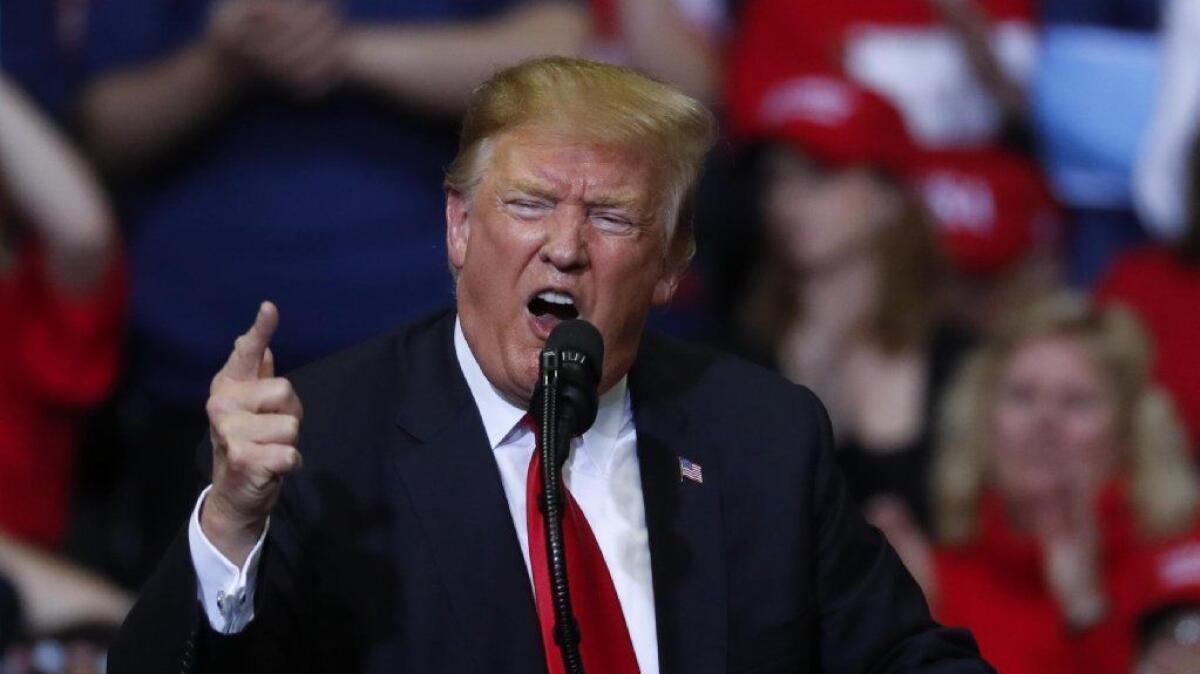The most transparent president ever (not)

- Share via
Reporting from Washington — President Trump doesn’t like submitting to oversight from Congress.
His response to subpoenas and other requests from Democrats increasingly comes down to a single word: No.
The Justice Department has refused to give Congress an unredacted copy of the report by special counsel Robert S. Mueller III on Russian interference in the 2016 campaign. Trump has refused to let his former White House counsel, Don McGahn, tell lawmakers about what he told Mueller, even though it’s already in the report.
The attorney general, William Barr, says he may refuse to appear before the House Judiciary Committee on Thursday if he has to answer questions from staff lawyers.
The Treasury Department has failed to comply with a House Ways and Means Committee request for six years of Trump’s tax returns, even though the tax code states that the Internal Revenue Service “shall furnish” any return requested by the committee.
Trump sued the chairman of the House Oversight and Reform Committee, Rep. Elijah E. Cummings (D-Md.), to block a subpoena for financial information about his businesses. On Monday, he also sued to stop Deutsche Bank AG and Capital One Financial Corp. from complying with congressional subpoenas targeting his bank records.
And he ordered a former aide to refuse to testify about whether Trump overruled intelligence officials and senior White House aides and ordered a top-secret security clearance for Jared Kushner, his son-in-law.
“We’re fighting all the subpoenas,” Trump explained last week. “Look, these aren’t like impartial people. The Democrats are trying to win 2020.”
“I have been the most transparent president and administration in the history of our country by far,” he added, an odd assertion under the circumstances.
The president didn’t say he would contest specific subpoenas that he considers excessive or unfair. He said he was fighting all of them, apparently because they came from the opposing party. That’s not how the balance of powers between the president and Congress is supposed to work.
The argument would be laughable if it weren’t so dangerous. Trump is pushing the country toward a constitutional crisis. This isn’t transparency. If anything, it’s a war on transparency, a crusade against accountability.
Of course Democratic committee chairmen aren’t impartial. Nor were the Republican chairmen they replaced after the midterm election in November.
But that’s how the Constitution works. The Supreme Court has long held that Congress holds the “power of inquiry,” no matter which party is in power.
Trump’s argument is so flimsy that some lawyers think he merely wants to mire the Democrats in litigation until election day, 18 months away. Or, some suggest, perhaps he seeks to goad House Democrats into impeaching him, knowing the process would die in the Senate and arguably boost his chances next year.
But even if it’s only legal rope-a-dope, Trump’s efforts to choke congressional oversight are part of a much broader effort by his administration to avoid independent scrutiny and accountability.
Related: Former White House Counsel Don McGahn subpoenaed in aftermath of Mueller report »
Trump’s administration has methodically concealed information from Congress, the media and the public. There are fewer news briefings, fewer routine disclosures from government agencies, fewer releases under the Freedom of Information Act.
His White House removed its visitor logs from public view, so citizens can’t find out when lobbyists are coming in the door. The chiefs of his regulatory agencies have been caught, over and over, hiding their meetings with corporate moguls.
Trump stopped the reporting of CIA drone strikes against suspected terrorists. The Pentagon stopped reporting how many nuclear weapons the United States maintains.
The White House press secretary, Sarah Huckabee Sanders, has held only two news briefings this year; they were once a daily ritual. The State and Defense Departments have all but given up regular briefings about foreign policy, military operations around the globe, and the spending of hundreds of billions of taxpayer dollars.
Reporters still seek information but their requests are often ignored. (Google “the White House did not respond,” and you’ll see what I mean.)
Trump talks directly with reporters more often than previous presidents, but usually in brief, impromptu sessions he can cut off at will. And he broadcasts his thoughts on Twitter, unrestrained by facts.
But logorrhea is not the same as transparency. Trump’s comments to reporters are mostly a monologue, a convenient way for the president to vent — not an opportunity for extended questioning.
None of this is new. Trump began his 2016 campaign by falsely claiming he couldn’t release his tax returns because he was under audit. No rule forbids him from releasing his returns, audit or no.
Before his inauguration, he said he was turning control of his business over to his sons, but refused to release the trust agreements governing the arrangement.
In his first two years in office, a compliant Congress, led by Republicans in both houses, did little to hold him accountable. Now that Democrats are trying to do just that, he’s doing everything he can to shield himself — stonewalling, filing lawsuits and trying to rewrite the rules.
The most transparent president in history? Not even close.
More to Read
Get the L.A. Times Politics newsletter
Deeply reported insights into legislation, politics and policy from Sacramento, Washington and beyond. In your inbox twice per week.
You may occasionally receive promotional content from the Los Angeles Times.











